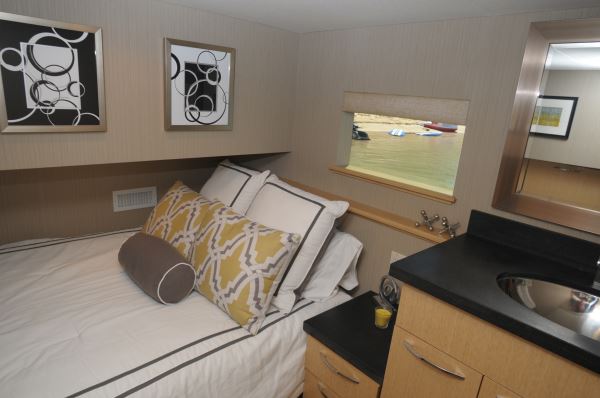
Living aboard is more than popping into the marina for a picnic cruise. It’s eating, sleeping and showering onboard. It’s rainy days, entertaining and sometimes even earning a living while enjoying the nomad life. Whether you live onboard full-time or part-time, you have unique privileges and concerns. Here are ways to make houseboat life safer, easier and more fun.
Sleep Aid
Humans spend a third of their lives in bed so the mattress in the master stateroom is probably one of the first things that will need replacing or upgrading in your houseboat. Comfort comes first, but also consider weight, especially for a mattress that lifts up for under-bed storage. It’s even more complicated if your mattress is not a standard size or shape.
A number of companies specialize in custom bedding for boats. Choose any type of foam (open cell, closed cell, memory foam) in your choice of thickness, plus any shape and cover material. Sources include www.FoamOrder.com, www.FormSource.com and www.FoamFactory.com. Two sides of the same foam mattress can be made different, one softer and one firmer, to suit different sleeping partners. One company will even send you a special bag that allows you to vacuum-compress the old mattress or cushions for shipment to them so they can make an exact copy.
The ABCs Of ELTs
Airplanes carry an Emergency Locator Beacon (ELT). For boating, similar devices are called EPIRBs (Emergency Position Indicating Radio Beacon). Another lifesaver is a PLB, or Personal Locator Beacon. Why do you need one?
Cell phones have limited range, limited battery life, many dead spots and they require a monthly fee. By contrast, a pocket-size PLB can go ashore with you and send a distress signal from anywhere on earth. It goes to a satellite, which then sends your exact position to the nearest authorities. Batteries last hours, sometimes days. Aside from the purchase price, the only cost is to buy a new battery about every five years.
PLBs are catching on with anglers, skiers, hikers, bicycle riders and many other adventurers. If your houseboat takes you to remote shores (and we hope it does), a PLB is inexpensive, reliable, personal insurance.
Pets Onboard
 The continuing war on dangerous dogs is a problem for cruising houseboaters because it’s a moving target. Bans are usually city by city (although Ontario, Canada, has a province-wide rule) and the list of banned breeds is different in each place. In some places, you can keep the banned pet but you must muzzle it. According to www.PawNation.com, the 10 top banned breeds include American Bulldogs, Bloodhounds, Doberman Pinschers, Neapolitan Mastiffs, Pit Bulls, and Rottweilers.
The continuing war on dangerous dogs is a problem for cruising houseboaters because it’s a moving target. Bans are usually city by city (although Ontario, Canada, has a province-wide rule) and the list of banned breeds is different in each place. In some places, you can keep the banned pet but you must muzzle it. According to www.PawNation.com, the 10 top banned breeds include American Bulldogs, Bloodhounds, Doberman Pinschers, Neapolitan Mastiffs, Pit Bulls, and Rottweilers.
If you cruise with a “dangerous” breed, check each destination ahead because bans, and the breeds affected, keep changing. Keep a muzzle on hand in case it’s required, train the dog to obey your commands and be a responsible pet owner. The chief reasons marinas ban all dogs are, failing to pick up dog mess, dogs lifting a leg on dock lines and people who bathe dogs in marina showers.
Kids Onboard
Identity theft can be a special threat to people who live on the go. One of the latest scams affecting families is childhood identity theft. It’s unlikely to show up on your credit report, so you may not know about the theft for months or even years. Some crooks hijack your child’s social security number and use it for a variety of purposes. Some steal only the child’s medical identity. For information go to the Federal Trade Commission at www.ftc.gov.
Your Mobile Business
Thanks to the Internet, temporary help agencies and tele-commuting, it’s possible to retire at any age, go cruising and make a living anywhere. For many entrepreneurs and independent contractors the first step is to choose a powerful brand name. Go to www.uspto.com to see if the name has already been trademarked. (While on the site you might also see what names were chosen by businesses that will be your competition.) Next, protect your intellectual property with a trademark or patent at that URL or get a copyright at www.Copyright.gov.
A Tax Tip
In the past, this column has outlined possible ways to use your houseboat as a tax deduction. Nationally-recognized tax authority Julian Block, www.julianblocktaxexpert.com, suggests one more wrinkle. If the houseboat is your home and you must modify it for medical reasons, costs may be all or partially deductible. Get a letter from your doctor and keep track of all receipts. Work with your tax advisor from the beginning to make sure you take all necessary steps.
Future Shock
Keeping up with the times, you can now get marine electric outlets that have both regular and USB ports. Another new system is designed for cruising overseas where hook-ups are 230 volts, 63 amps. Both are from Hubbell and are available from your marine electrician.